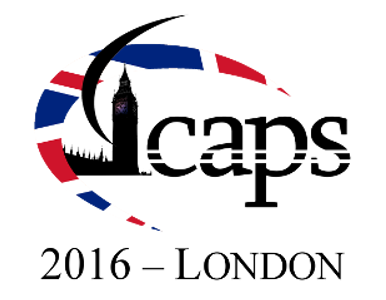Important Dates
- 18 Nov, 2015 - Abstracts Due
- 22 Nov, 2015 - Submissions Due
- 26 Jan, 2016 - Notification
Special Tracks
ICAPS 2016 Novel Applications Track
Call For Papers
Following the success of the Special Track on Novel Applications at previous ICAPS conferences, the ICAPS 2016 will host again a Novel Applications Track as part of the ICAPS 2016 conference.
ICAPS 2016, the 26th International Conference on Automated Planning and Scheduling, will take place in London, UK, 12-17 June 2016. ICAPS 2016 is part of the ICAPS conference series, the premier forum for exchanging news and research results on theory and applications of intelligent planning and scheduling technology.
The goal of this special track is to encourage the submission of papers describing all aspects of the development, deployment and evaluation of planning and scheduling systems for real-world problems. Topics addressed in applications papers may include, but are not limited to:
- Description and modelling of novel application domains
- ngineering issues in using P&S techniques
- Integration of multiple P&S techniques, or of P&S techniques with techniques from other areas or disciplines
- User interface design, visualization and explanation for a P&S application
- Experiences in development, deployment and maintenance of P&S applications
- Evaluation, testing, and validation of P&S applications
- Assessment of impact on end users
In order to ensure that papers are reviewed fairly, the track has a separate programme committee consisting of individuals with experience working on applications of Planning and Scheduling technology to real world problems. Papers submitted to this track will be evaluated using different criteria, particularly:
- Significance of the application problem being addressed
- Importance of Planning and Scheduling technology to solution of the problem
- Novelty of the application and technical approach to the application
- Evaluation of the system
- Clarity of the descriptions of the application problem, techniques used, and results
Important Dates
- 18 November 2015 - Abstracts (electronic submission) due
- 22 November 2015 - Papers (electronic submission, PDF) due
- 26 January 2016 - Notification of acceptance
The reference timezone for all deadlines is UTC-12. That is, as long as there is still some place anywhere in the world where the deadline has not yet passed, you are on time!
Submission Instructions
Authors may submit long papers (8 pages AAAI style plus up to one page of references) or short papers (4 pages plus up to one page of references). The type of paper must be indicated at submission time.
All papers, regardless of length, will be reviewed against the standard criteria of relevance, originality, significance, clarity and soundness, and are expected to meet the same high standards set by ICAPS. Full technical papers are expected to report on a significant applications effort, emerging or deployed, while short papers may report on more limited aspects of a particular application, approach or study.
Authors making multiple submissions must ensure that each submission has significant unique content. Papers submitted to ICAPS'16 may not be submitted to other conferences or journals during the ICAPS'16 review period nor may they be already under review or published in other conferences or journals. Overlength papers will be rejected without review.
All submissions will be made electronically, through the EasyChair conference system: www.easychair.org/conferences/?conf=icaps16.
Submitted PDF papers should be anonymous for double-blind reviewing, adhere to the page limits of the relevant track CFP/submission type (long or short), and follow the AAAI author kit instructions for formatting: http://www.aaai.org/Publications/Author/author.php
In addition to the submitted PDF paper, authors can additionally submit supplementary material (videos, technical proofs, additional experimental results) for their paper. Please make sure that the supporting material is also anonymized. Papers should be self-contained; reviewers are encouraged, but not obligated, to consider supporting material in their decision.
Organizing Committee
Novel Applications Track chairs:
- Gabriella Cortellessa (CNR, Italy)
- Neil Yorke-Smith (American University of Beirut, Lebanon)
Conference Chairs
- Andrew Coles (King's College London)
- Daniele Magazzeni (King's College London)
Program Chairs
- Amanda Coles (King's College London)
- Stefan Edelkamp (University of Bremen, Germany)
- Scott Sanner (NICTA and ANU, Australia)
Program Committee
- Roman Barták, Charles University, Czech Republic
- Sara Bernardini, University College London, UK
- Julien Bidot, Örebro University, Sweden
- Mark Boddy, Adventium Labs, USA
- Daniel Borrajo, Universidad Carlos III de Madrid, Spain
- Luis Castillo-Vidal, IActive Intelligent Technologies, Spain
- Amedeo Cesta, ISTC-CNR, Italy
- Brad Clement, NASA JPL, USA
- Riccardo De Benedictis, ISTC-CNR, Italy
- Jeremy Frank, NASA Ames Research Center, USA
- Robert Goldman, Smart Information Flow Technologies, USA
- Mark Giuliano, Space Telescope Science Institute, USA
- Mark Johnston, NASA JPL, USA
- Russell Knight, NASA JPL, USA
- Philippe Laborie, IBM, France
- Lee McCluskey, University of Huddersfield, UK
- Karen Myers, SRI International, USA
- Eva Onaindia, Universidad Politecnica de Valencia, Spain
- Federico Pecora, Örebro University, Sweden
- Nicola Policella, ESA/ESOC, Germany
- Cédric Pralet, ONERA, France
- Ioannis Refanidis, University of Macedonia, Greece
- Miguel A. Salido, Universidad Politéica de Valennia, Spain
- David E. Smith, NASA Ames Research Center, USA
- Stephen F. Smith, Carnegie Mellon University, USA
- Shirin Sohrabi, IBM Research, USA
- Florent Teichteil-Koenigsbuch, Airbus, France
- Pascal Van Hentenryck, University of Chicago, USA
- Tiago Vaquero, University of Toronto, Canada
- Pradeep Varakantham, Singapore Management University, Singapore
